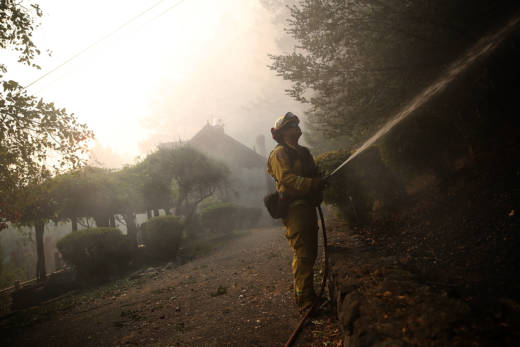Federal officials suspect tens of thousands of fraudulent claims for disaster relief have been filed following the deadly fires that destroyed thousands of structures in Northern California. The process of vetting claims for disaster relief is thorough, officials say, so why are some people getting checks from the government they didn’t ask for?
“It does happen,” FEMA spokesman Frank Mansell says.
Since the fires, some residents have been getting fake mail, phone calls and emails. People claiming to be federal officials have showed up at their doors. FEMA has been warning of these scams and telling people how to avoid them.
An Automatic $500
When a disaster hits and FEMA starts taking applications for relief money, people can apply online or by phone. The application includes several questions designed to verify that person's identity and determine what their needs are. This initial step is where a lot of fraud happens. With identity theft common, scammers sometimes get access to important personal information like Social Security numbers, birthdates and contact information. The stuff they don't have access to, such as income and need, they make up.
But completing the initial application on its own doesn't always secure disaster relief money.
Mansell says that after FEMA verifies someone's identity using personal information, there is a single question on the application (he won’t say which) that automatically “triggers” the agency to send a $500 check.
That $500 is known as “critical needs assistance.” The money is meant to be allocated quickly to help pay for immediate needs, like shoes, food or a hotel room, Mansell says.
In Scarff’s case, she received a letter from FEMA on Oct. 26, asking her to confirm certain information on the application that someone else had filled out on her behalf. She didn’t respond to that letter and never spoke with anyone from FEMA by phone. Yet, two days later, she received a $500 check.
Whoever filled out the form in her name had correctly answered the “trigger” question, Mansell says. Scarff deposited the check, thinking the IRS maybe owed her money.
“The check had cashed," she says. "It was in my account, so I knew it was real."
But something didn’t feel right.
Scarff went to the local disaster assistance center in Sonoma, where officials found an open registration number under her name. She explained that she had not filled out an application.
“Their eyes went up," she says. "Big, wide elephant eyes. And everybody discovered there was something going on."
Officials canceled her application, and she later returned the money to the U.S. Treasury.
Quick Relief When a Disaster Hits
FEMA’s job in a disaster is to help people quickly.
After Hurricane Katrina, FEMA was criticized for being too slow in providing help. Now Mansell says its effort to move more quickly means some money may be going to people who don’t need it.
“That’s something that we wrestle with every time,” Mansell says. “It’s a pendulum."
But there are checks and balances.
FEMA will flag applications that seem suspicious, and the agency follows up with people who got the $500 critical needs checks. If the agency discovers the checks were issued on a false basis, it could penalize those who keep the money.
Mansell can’t say how often people receive checks they didn’t apply for. Scarff says she knows two other people who received letters like hers but who didn't get checks. At this point it's unknown how many people may be victims of the scams. For its part, FEMA says there might be tens of thousands of fraudulent claims, but those numbers could include legitimately filed but duplicate applications or other anomalies.
Any suspected cases of fraud are forwarded to the Office of the Inspector General for the U.S. Department of Homeland Security. An official in that office declined to say how many claims are being investigated.
Scarff says she’s still on alert.
She says a man knocked on her door last Friday morning. He wore what looked like an emergency worker's overcoat. Through the window, she asked what he wanted. The man asked for someone named Kevin. Scarff told him there was no one there by that name and the man went away.
If you do need disaster relief, the deadline to file is Dec. 11.
If you suspect criminal or suspicious activity related to disaster relief or if you received a letter from the U.S. Small Business Administration and you did not apply for disaster relief with FEMA or the SBA, report to the National Disaster Fraud Hotline at 1-866-720-5721 or by email at disaster@leo.gov and contact the SBA Customer Service Center at 1-800-659-2955.
